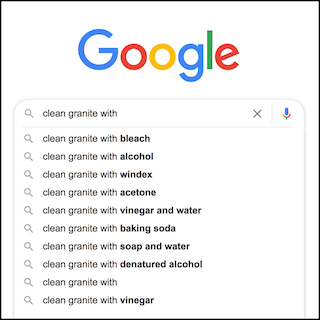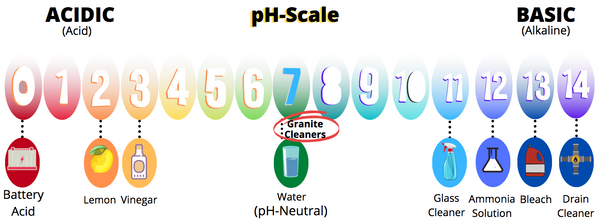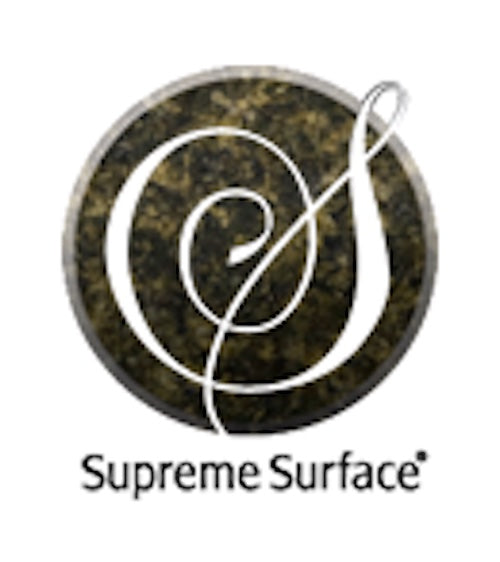
How to Clean Granite Countertops without Damage
Share
How to Clean and Maintain Granite Countertops
Not all products are safe for granite.
One of the largest points of confusion for granite is maintenance. A quick google search for "clean granite with..." shows "common phrases" that are both damaging and ineffective. The truth is, however, that most individuals do not research before cleaning. We've all done it before, grabbing the first cleaner under our sink. Unfortunately, many all-purpose cleaners are not safe to use on granite countertops. Granite, like all natural stones, requires specific types of cleaners.

Just like how improper detergent will fade your clothing, improper cleaners will erode/dull your granite.
Granite is a porous and sensitive surface. The porosity means that it is susceptible to staining, and the sensitivity means to be careful with which cleaners you use. For these reasons, if you were to consult with your local granite installer, they would likely recommend only using pH-neutral cleaners and sealing your granite countertop annually.
Granite's durable yet sensitive characteristics come from being a siliceous natural stone. This allows granite to be more durable and resilient than stones such as marble or limestone, but the presence of acid-sensitive and alkaline-sensitive minerals means that abrasive cleaners will damage the surface.
"Acid and alkaline-sensitive" means that products such as vinegar, window/glass cleaner, CLR, lemon juice, oven-cleaner, and bleach should never be used on granite.
Using any of the mentioned products leads to a chemical damage called "etching."

pH-Neutral Cleaners
Since we established that granite must be cleaned with pH-neutral cleaners, it's important to understand that certain messes are resistant to pH-neutral cleaners. pH-neutral cleaners can be thought of as "mild" cleaners. Although they are safe to use on most surfaces, They will not work for all messes or stains. This is typically noticed when individuals attempt to remove hard water stains and mineral deposits from granite.
The following is a list of messes that can not be cleaned with pH-neutral cleaners:
- Hard water spots/Hard water stains
- Mineral Deposits (Calcium/Limescale)
- Rust
- Stains
- Etch Marks
These messes will require other means of cleaning. For hard water stains/spots, refer to our Scum & Mineral Deposit Remover. For rust, stains, or etch marks, call our stone-care professional at 317-865-0000, and we will manually provide assistance.
Where to Find pH-Neutral Cleaners
pH-neutral cleaners come under various names, brands, and purposes. They can be found on many online stores and retail shops. While this is true, it is worth it to ensure that your product is designed for granite surfaces. This will prevent the possibility of acidic/alkaline damage. To view the Supreme Surface product line for granite, click here.
Maintenance/Prevention/Protection
Because of granite's susceptibility to staining and the difficulty of removing resistant messes, it's important to properly protect your surface.
1. Penetrating Sealers
There are two primary methods of protecting your countertop, both using sealers of different sorts. The first, and most commonly known method is by using a penetrating sealer. Penetrating sealers are generally recommended to be used every one or two years. The frequency varies depending on the characteristics of the stone. If your surface is unsealed, it is highly recommended to view our blog, Sealing Granite Countertops: What to Know
2. ioSeal
Supreme Surface highly recommends the second method: using ioSeal Protectants. Using ioSeal is a much easier and more pleasant process than using penetrating sealers, and it can be done simultaneously while cleaning.
ioSeal Protectants defend your surface from staining, UV-fading, mineral deposits, and more, making granite maintenance easier.
For a brief demonstration of how ioSeal works, we've attached an image below.

Conclusion
In conclusion, make sure that you only use pH-neutral cleaners on your granite countertops, and that you properly maintain and protect your surface with the two steps we mentioned above. For resistant messes such as mineral deposits, refer to a scum and mineral deposit remover for granite, and for abrasive damage, give our phone line a call for step-by-step instructions. These resources should keep your surface clean, healthy, and beautiful for years to come. For any questions, contact our phone line. Happy Cleaning!
Got questions? Call Today @317-865-0000.




